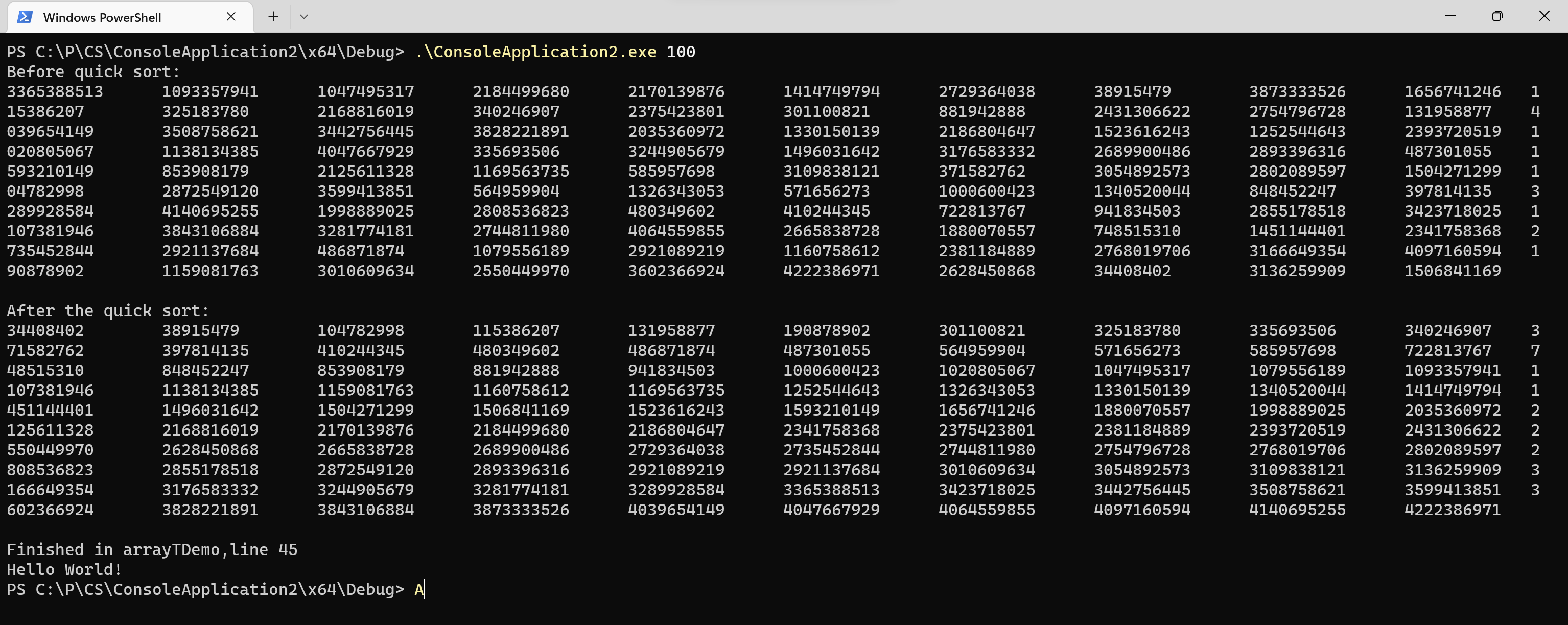// ConsoleApplication2.cpp : This file contains the 'main' function. Program execution begins and ends there. // #include <ctime> #include <iostream> #include <random> using namespace std; template<typename T> void swap(T* x, T* y); template<typename T> int partitionAsc(T* arr, int low, int high); template<typename T> void quickSortAsc(T* arr, int low, int high); template<typename T> void printArray(T* arr, int len); template<typename T> void getTArray(T* arr, int len); template<typename T> void arrayTDemo(int len); int main(int args,char**argv) { arrayTDemo<uint32_t>(atoi(argv[1])); std::cout << "Hello World!\n"; } template<typename T> void arrayTDemo(int len) { T* arr = new T[len]; getTArray(arr, len); cout << "Before quick sort:" << endl; printArray(arr, len); cout << "After the quick sort:" << endl; quickSortAsc(arr, 0, len - 1); printArray(arr, len); delete[]arr; cout << "Finished in " << __FUNCTION__ << ",line " << __LINE__ << endl; } template<typename T> void getTArray(T* arr, int len) { mt19937_64 mt(time(nullptr)); for (int i = 0;i < len;i++) { arr[i] = mt(); } } template<typename T> void printArray(T* arr, int len) { for (int i = 0;i < len;i++) { cout << arr[i] << "\t"; } cout << endl << endl; } template<typename T> void quickSortAsc(T* arr, int low, int high) { if (low <= high) { int pivot = partitionAsc(arr, low, high); quickSortAsc(arr, low, pivot - 1); quickSortAsc(arr, pivot + 1, high); } } template<typename T> int partitionAsc(T* arr, int low, int high) { T pivot = arr[high]; int i = low - 1; for (int j = low;j <= high;j++) { if (arr[j] < pivot) { i = i + 1; swap(&arr[i], &arr[j]); } } swap(&arr[i + 1], &arr[high]); return i + 1; } template<typename T> void swap(T* x, T* y) { T temp = *x; *x = *y; *y = temp; } // Run program: Ctrl + F5 or Debug > Start Without Debugging menu // Debug program: F5 or Debug > Start Debugging menu // Tips for Getting Started: // 1. Use the Solution Explorer window to add/manage files // 2. Use the Team Explorer window to connect to source control // 3. Use the Output window to see build output and other messages // 4. Use the Error List window to view errors // 5. Go to Project > Add New Item to create new code files, or Project > Add Existing Item to add existing code files to the project // 6. In the future, to open this project again, go to File > Open > Project and select the .sln file
